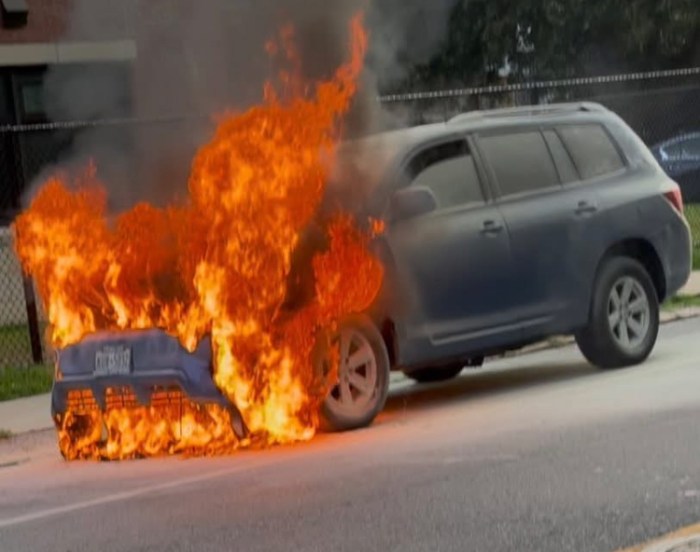County sponsors Narcan training at high school
Long Island communities are waging a war against prescription drug abuse and a rampant heroin epidemic. The county launched a free public training program in 2012 to teach ordinary citizens the signs of an overdose and how to reverse its effects using a drug called Narcan.
Garden City High School hosted one of these training events on Oct. 9 as a packed auditorium of parents and community members gathered to learn the skills needed to potentially save a life. Floral Park will host the event in December.
“Whatever brought you here, whether there’s an addicted person in your household or you maybe lost somebody to a drug overdose, or you just want to learn, whatever it is we’re glad you’re here,” said Director of Government Research for Nassau County Eden Laikin, who hosted the event.
Naloxone, commonly referred to as Narcan, is a drug used to combat overdoses caused by Opioids. Opioids are depressants that are used as painkillers, but in higher doses can slow breathing and cause death.
Naturally occurring Opioids such as morphine and codeine are called opiates. Typically people get addicted to semi-synthetic Opioids like Vicodin, OxyContin, Demerol and Percocet. Methadone and Fentanyl are fully synthetic and often used to treat addicts.
Since 2011, there have been more than 538 reported Opioid overdose deaths in Nassau County.
The majority of heroin overdoses are witnessed by other individuals so there is a chance to step in a save the person. But oftentimes no medical help is sought because of a fear of getting in legal trouble for drug possession. In 2011 New York State enacted a “Good Samaritan Law” to encourage more people to reach out for medical help.
“That’s the main topic of the night, to always call 911,” said Michael Seltzer, a Nassau County Police Paramedic volunteering at the event to demonstrate proper Narcan use.
The Good Samaritan Law grants immunity from criminal persecution to those seeking medical help for someone experiencing an OD. It also protects them from misdemeanor drug possession charges.
The Narcan kits given out at the end of the training classes are designed to be administered nasally. A fine mist is sprayed and absorbed into the mucus membranes in the nose. This is effective even if the person isn’t breathing.
Bryn Catapano, a clinical social worker with the county, was the main Narcan instructor for the evening. Seltzer and another paramedic, Steve Doucette, conducted demonstrations on how to assemble and administer the kits. They were both volunteering their time to give this crucial instruction.
ODs take between one and three hours and are categorized by heavy, uncontrollable nodding, a lack of response to stimulation, clammy skin, blue lips and/or pinpoint pupils.
Narcan only works on Opioids and doesn’t mix with other drugs. There are no harmful side effects, so the instructors say that when in doubt, administer the Narcan.
The kits themselves contain a yellow-capped syringe, nasal applicator and glass tube of the drug.
The instructors stressed that even if you use it, you must still call 911 for help.
To assemble the kit, remove the yellow cap from the syringe and lock in the nasal applicator with a quarter turn. This can be done ahead of time, but the Narcan tube should not be inserted into the syringe until you are ready to use it.
When administering the drug, give a half-push of the syringe into each nostril. Each tube contains one dose of 2 mg, with a second one included in the kit for backup.
Basic rescue breathing can also be administered to someone overdosing, even if you do not know CPR. Always turn the victim onto their side in case of vomiting.
It is not recommended that you keep your kit in your car because extreme weather conditions can affect the drug and cold temperatures may cause the glass tube to break. The Narcan given out in the kits does expire after two years and it is recommended that you request a new one at that point. The prescription cannot be obtained through a drugstore; you must contact the county at 516-227-7057. This number should also be called to anonymously report any time you use your kit so that statistics can be kept accurate.
Narcan creates an immediate withdrawal when administered. Someone revived by it will start to feel sick and unpleasant right away. It is possible they will become violent as well, so the instructors recommended stepping away after giving it to someone. If the Narcan successfully stopped an Opioid-related OD, the person should wake up right away.
Addictions to these drugs can affect people of all ages and backgrounds.
“We’ve been talking a lot about young people and adolescents because I think that’s what typically makes it so tragic. But adults as well are using Opiates, using their pain medication,” Catapano said.
It can also be tricky to find the assistance you need to face addiction. “It’s very hard to find help,” said one woman whose husband is an addict. Their insurance turned them down for treatment.
Recovering addict and interventionist Chris Genovese spoke at the beginning of the class and acknowledged the struggle, while remaining adamant that treatment was out there and possible for people if they knew where to look for it.
“I will help people one by one. If a person is willing to get clean there is help…I could find you a bed tonight,” Genovese said.
A Garden City native, Genovese struggled for many years with addictions to various substances. “This is a devastating disease and it hit me hard,” he explained. Genovese turned to drugs to help him deal with pressures and anxieties he placed on himself rather than talk about his feelings with others.
“A big thing for me was what people thought, and I did that all to myself,” he said. “There was no pressure put on me by the town. There was no pressure put on me by my parents.”
Genovese eventually got clean and now acts as an interventionist and counselor for families and adolescents struggling with addiction.
The next overdose prevention seminar will be held on Thursday, Dec. 4, at Floral Park Memorial High School, 210 Locust St. from 7 to 9 p.m. A veteran and veteran caregiver seminar on overdose prevention will also take place from 9:30 to 11:30 a.m. on Wednesday, Nov. 12, at the Theodore Roosevelt Executive & Legislative Building, 1550 Franklin Ave. in Mineola. No prior medical experience is necessary to participate in the training. All trainees will receive a certificate of completion. Anyone can attend but seating is limited and residents must therefore preregister either by emailing elaikin@nassaucountyny.gov or by calling 516-571-6105.
































